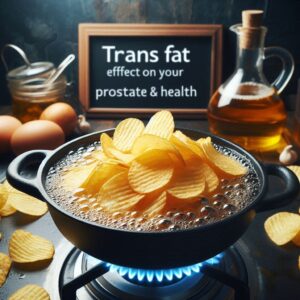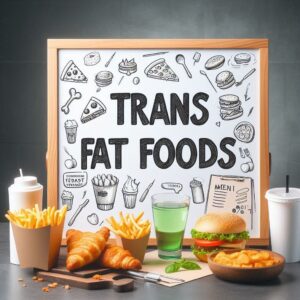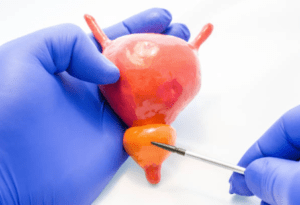The Toxic Truth About Trans Fat: Your Prostate & Heart Health

The Terrifying Truth About Trans Fat:
The effect of Trans fat on Your Prostate & Heart Health
You’ve heard the whispers: Trans fats are bad for you. But how bad are they, really? And what do they have to do with your prostate health? Let’s dive into the terrifying truth about trans fats and uncover their sneaky impact on your body.
Trans Fats Demystified: The Good, the Bad, and the Ugly
Alright, let’s break down this trans fat thing. You’ve heard they’re bad, but what are they exactly? Think of fats like a family, with different members playing different roles. Trans fats are the black sheep of the fat family—the troublemakers you want to avoid.
Naturally-Occurring Trans Fats: The “Meh” Cousins
These are the trans fats found naturally in small amounts in some animal products, like beef and dairy. They’re not the primary concern when it comes to your health. In fact, some research suggests they might even have some minor benefits. But don’t go loading up on red meat just yet; we’ll get to that.
Artificial Trans Fats: The Real Villains
These are the manufactured bad boys, created through a process called hydrogenation. Picture this: You take a healthy liquid vegetable oil and pump it full of hydrogen gas. This forces the oil molecules to rearrange themselves, turning the liquid into a solid. The result? A shelf-stable, spreadable fat that’s perfect for processed foods. But there’s a catch…
The Dark Side of Hydrogenation
Hydrogenation not only changes the texture of the oil; it also transforms its chemical structure. This creates artificial trans fats, which are incredibly harmful to your health. They wreak havoc on your cholesterol levels, clog your arteries, and increase your risk of heart disease, stroke, and other serious conditions.
Why Are Artificial Trans Fats So Common?
You might be wondering why food manufacturers use these harmful fats if they’re so bad for you. Well, there are a few reasons:
- Longer Shelf Life: Trans fats help prevent oils from going rancid, extending the shelf life of processed foods.
- Improved Texture: They give baked goods a desirable flaky texture and make fried foods crispy.
- Lower Cost: Trans fats are often cheaper than healthier alternatives.
But those benefits come at a steep price: your health.
The Bottom Line: Trans Fats are Trouble
Artificial trans fats are the real villains here. They offer no nutritional value and pose serious health risks. So, how can you protect yourself? Read on to discover the sneaky sources of trans fats and how to avoid them.

Trans Fat Hideouts: Unmasking the Sneaky Saboteurs of Your Health
So, we know trans fats are bad news, but where are these dietary villains hiding out? They’re like ninjas, lurking in seemingly innocent foods and sabotaging your health from the inside out. Let’s shine a spotlight on their favorite hideouts:
1. The Fried Food Fiesta:
Imagine a plate piled high with crispy french fries, golden doughnuts, and succulent fried chicken. It’s a feast for the senses, but unfortunately, it’s also a trans-fat minefield. These deep-fried delights are often cooked in oils loaded with trans fats, which can quickly add up and wreak havoc on your heart and prostate.
2. The Baked Goods Bonanza:
Those flaky pastries, mouthwatering cookies, and decadent cakes might look tempting, but they often harbor a secret ingredient: trans fats. These sneaky additives give baked goods their irresistible texture and longer shelf life, but they also deliver a hefty dose of health risks.
3. The Processed Snack Attack:
Think crackers, chips, and microwave popcorn are harmless snacks? Think again! Many of these processed treats contain hidden trans fats, making them wolves in sheep’s clothing. While they might satisfy your cravings temporarily, they’re not doing your body any favors.
4. The Lurking Spreadables:
Stick margarine and shortening might seem like convenient kitchen staples, but they often contain partially hydrogenated oils, a major source of trans fats. Even if the label claims “0 grams trans fat,” it’s essential to check the ingredient list for partially hydrogenated oils, as manufacturers can legally round down if the amount per serving is less than 0.5 grams.
Beyond the Usual Suspects:
Trans fats can also be found in other unexpected places:
- Frozen pizzas: Some brands use trans fats in the crust for a flakier texture.
- Nondairy creamers: Certain varieties contain partially hydrogenated oils for a creamier consistency.
- Ready-to-use frosting: Trans fats might be lurking in those pre-made tubs of sugary goodness.
Your Trans Fat Detective Kit:
Now that you know where trans fats like to hide, how can you avoid them? Here’s your detective kit for uncovering their secret presence:
- Read labels religiously: Look for “partially hydrogenated oils” in the ingredient list.
- Choose whole, unprocessed foods: opt for fresh fruits, vegetables, whole grains, and lean proteins.
- Cook at home more often. This gives you control over the ingredients and cooking methods you use.
- Ask questions when dining out: Inquire about the oils used for frying and whether trans fats are present in menu items.
The Bottom Line: Don’t Be Fooled!
Trans fats are masters of disguise, but armed with this knowledge, you can outsmart them and protect your health. Remember, the choices you make today can have a lasting impact on your well-being tomorrow. So, be a savvy shopper, a mindful eater, and a champion for your own health.
Trans Fat Havoc: Unraveling the Triple Threat to Your Health
You’ve heard the saying, “You are what you eat.” Well, when it comes to trans fats, that saying couldn’t be more accurate. These sneaky saboteurs wreak havoc on your body, setting off a chain reaction of health problems that can affect you from head to toe. Let’s break down the triple threat trans fats pose to your well-being:
1. Cholesterol Chaos: The Double Whammy
Think of your cholesterol levels like a seesaw. You want the “good” HDL cholesterol high and the “bad” LDL cholesterol low. Trans fats throw this delicate balance into disarray. They simultaneously raise your LDL cholesterol and lower your HDL cholesterol, creating a perfect storm for heart problems.
Imagine your arteries as highways for blood flow. High LDL cholesterol is like bumper-to-bumper traffic, clogging your arteries and slowing down circulation. This increases your risk of heart disease, stroke, and other cardiovascular problems. Trans fats are the reckless drivers causing this traffic jam, putting your heart health in jeopardy.
2. Inflammation Instigator: The Silent Threat
Inflammation is your body’s natural response to injury or infection. It’s like a fire alarm, alerting your immune system to a problem. But when inflammation becomes chronic, it’s like a fire alarm that won’t shut off. This can damage your cells and tissues, increasing your risk of various health issues, including prostate problems.
Trans fats are notorious inflammation instigators. They trigger a low-grade inflammatory response throughout your body, setting the stage for chronic diseases. This silent threat can wreak havoc on your prostate, contributing to inflammation and potentially increasing your risk of prostate cancer.
3. Heart Hazard: The Ticking Time Bomb
The dangers of trans fats don’t stop at cholesterol and inflammation. They also pose a significant risk to your heart health. Consuming trans fats can lead to the buildup of plaque in your arteries, a condition known as atherosclerosis. This narrowing of the arteries restricts blood flow to your heart, increasing your risk of heart attack and stroke.
Think of your heart as a pump that keeps your blood circulating throughout your body. Atherosclerosis is like a clogged pipe, making it harder for your heart to do its job. Trans fats are the culprits behind this clogging, slowly but surely putting your heart at risk.
But the dangers don’t stop there. Trans fats have also been linked to an increased risk of type 2 diabetes, a metabolic disorder that affects how your body uses sugar. This further compounds the threat to your cardiovascular health.
The Bottom Line: Trans Fats are a Recipe for Disaster
Trans fats are a triple threat to your health, disrupting your cholesterol balance, triggering inflammation, and jeopardizing your heart health. By avoiding these harmful fats, you can protect yourself from a wide range of chronic diseases and improve your overall well-being. It’s time to take charge of your health and say no to trans fats!
Trans Fats and Your Prostate: A Troubling Tango
Gentlemen, it’s time to talk about a sensitive topic: your prostate. You may not give it much thought, but this walnut-sized gland plays a crucial role in your reproductive and urinary health. And guess what? Trans fats could be messing with it.
The Prostate-Trans Fat Connection: What the Science Says
While the research is still ongoing, studies have suggested a potential link between trans fat consumption and an increased risk of prostate cancer. Now, before you panic, it’s important to note that this doesn’t mean a single french fry will doom you to prostate problems. However, the evidence is mounting that trans fats are not exactly friends to your prostate.
Here’s what we know so far:
- Inflammation: Trans fats trigger inflammation throughout the body, including the prostate. Chronic inflammation is a known risk factor for various diseases, including cancer.
- Hormonal Imbalance: Trans fats may disrupt hormone levels, potentially influencing prostate cell growth and promoting tumor development.
- Oxidative Stress: These harmful fats increase oxidative stress, which can damage cells and contribute to cancer development.
What Does This Mean for You?
While more research is needed to fully understand the connection between trans fats and prostate health, the existing evidence paints a concerning picture. If you’re a man concerned about prostate health, it’s wise to minimize your trans fat intake as a precautionary measure.

Prostate Protection: Tips for a Healthier Gland
Protecting your prostate involves more than just avoiding trans fats. Here are some additional tips to keep this vital gland healthy:
- Maintain a Healthy Weight: Obesity is a risk factor for prostate cancer.
- Eat a Balanced Diet: Focus on fruits, vegetables, whole grains, and lean protein sources.
- Exercise Regularly: Physical activity has been linked to a reduced risk of prostate cancer.
- Get Regular Check-ups: Talk to your doctor about prostate cancer screening, especially if you have a family history of the disease.
Your Prostate Matters: Take Action Today
Your prostate deserves your attention and care. By making healthy choices and prioritizing a trans fat-free diet, you can take proactive steps to protect this vital gland and safeguard your overall well-being. Remember, prevention is always better than cure. So, why not give your prostate the love it deserves?
The Trans Fat Rebellion: Governments Fight Back
Remember when we talked about trans fats being the villains of the food world? Well, it turns out even governments are on to their evil schemes. Around the globe, a revolution against trans fats is underway, with countries taking a stand to protect their citizens’ health.
The FDA’s Bold Move: Banning Artificial Trans Fats
In a landmark decision, the U.S. Food and Drug Administration (FDA) declared war on artificial trans fats in 2015. They gave food manufacturers three years to remove these harmful substances from their products, effectively banning them from the American food supply. This move is expected to prevent thousands of heart attacks and deaths each year. Talk about a victory for public health!
A Global Movement: Other Countries Join the Fight
The U.S. isn’t alone in this battle. Many other countries have followed suit, implementing bans or restrictions on trans fats. This global crackdown is gaining momentum as more and more nations recognize the devastating impact these fats have on their populations.
Trans Fat Resistance: Loopholes and Labeling Tricks
Despite the progress, trans fats aren’t completely eradicated. They can still be found lurking in some processed foods, often hiding behind tricky labels. Here’s what to watch out for:
- Partially Hydrogenated Oils: This is the main source of artificial trans fats. Even if a product claims “0 grams trans fat,” it may still contain small amounts if partially hydrogenated oils are listed in the ingredients.
- “Trans Fat-Free” Claims: Some products may technically be trans fat-free but still contain unhealthy levels of saturated fat, which can also raise your cholesterol levels. Don’t be fooled by misleading labels!
Your Role in the Rebellion: Be a Label Detective
As a savvy consumer, you have the power to fight back against trans fats. Arm yourself with knowledge and become a label detective. Always read the ingredient list carefully, scrutinize nutrition labels, and choose products made with healthier fats. By making informed choices, you can protect your health and support the global movement against trans fats.
The Future of Trans Fats: A Continued Struggle
The fight against trans fats is far from over. While progress has been made, there’s still work to be done. It’s up to us, as consumers, to demand healthier options and hold food manufacturers accountable. By staying informed and making conscious choices, we can contribute to a future where trans fats are a thing of the past.
Ditch the Trans Fats: Your Action Plan for a Healthier Prostate and Heart
Ready to break up with trans fats? Good! It’s time to take charge of your health and kick these toxic imposters to the curb. Here’s your action plan for a trans fat-free life:
1. Become a Label-Reading Ninja:
Think of yourself as a food detective, armed with the knowledge that “partially hydrogenated oils” are code for “trans fats lurking here.” Don’t be fooled by labels claiming “0 grams trans fat”—if t those sneaky oils are in the ingredient list, trans fats are likely present, even if the amount is small.

2. Break Up with Processed Foods:
Processed foods are like that toxic ex you can’t seem to shake. They might seem tempting in the moment, but they’ll only leave you feeling lousy in the long run. It’s time to cut ties with those sugary snacks, salty chips, and pre-packaged meals. Instead, focus on nourishing your body with whole, unprocessed foods like:
- Vibrant fruits and vegetables: are packed with vitamins, minerals, and antioxidants.
- Fiber-rich whole grains: Think brown rice, quinoa, and whole-wheat bread.
- Lean protein powerhouses: Opt for chicken, fish, beans, and lentils.
3. Embrace the Good Fats:
Not all fats are created equal. In fact, some fats are essential for your health! Unsaturated fats, found in foods like olive oil, avocados, nuts, and seeds, can help lower bad cholesterol and reduce inflammation. So go ahead, drizzle that olive oil on your salad and sprinkle some nuts on your yogurt—your body will thank you!
4. Become a Kitchen Maestro:
Cooking at home isn’t just a fun hobby; it’s a powerful way to protect your health. When you prepare your meals, you control the ingredients, cooking methods, and portion sizes. This gives you the freedom to create delicious, nutritious dishes that are free from trans fats and other harmful additives. Plus, it’s a great way to bond with loved ones and express your creativity!
5. Dine Out Defensively:
Eating out doesn’t have to derail your trans fat-free mission. Just be a savvy diner by asking questions about the ingredients and cooking methods used. Most restaurants are happy to accommodate dietary requests, so don’t be afraid to speak up and make healthy choices.
Bonus Tip: Don’t Be Fooled by “Health Halo” Foods
Just because a food is labeled “low-fat” or “reduced-fat” doesn’t automatically make it healthy. Sometimes, these products replace trans fats with other unhealthy ingredients, like sugar or refined carbs. Always read the label carefully and choose foods that are truly nourishing for your body.
The Trans Fat-Free Lifestyle: A Commitment to Your Health
Avoiding trans fats is more than just a dietary change; it’s a commitment to your health and well-being. By following these tips and making conscious choices, you can protect your heart, prostate, and overall health from the damaging effects of these harmful fats. Remember, every small step you take towards a healthier lifestyle adds up to a big difference in the long run. So, ditch the trans fats and embrace a vibrant, fulfilling life!

FAQ: Your Crucial Questions Answered
FAQ-1: Are all fats bad for my prostate and heart health?
Absolutely not! Not all fats are created equal. Unsaturated fats, found in foods like olive oil, avocados, nuts, and seeds, are actually beneficial for your health. It’s the saturated and trans fats that you need to limit, as they can raise cholesterol levels and increase the risk of heart disease and other health problems, potentially including prostate issues.
FAQ-2: How can I tell if a food contains trans fats, even if it’s not explicitly stated on the label?
Check the ingredient list for “partially hydrogenated oils.” Even if the label claims “0 grams trans fat,” the presence of partially hydrogenated oils means the food likely contains trans fats, albeit in small amounts.
FAQ-3: I’ve heard there are natural trans fats. Are those harmful too?
Yes, there are naturally occurring trans fats found in some animal products. However, they are present in much smaller amounts compared to artificial trans fats and are generally not considered a significant health risk. The primary concern is artificial trans fats created through hydrogenation.
FAQ-4: What are some healthier alternatives to trans fats that I can use in cooking and baking?
There are plenty of healthier options available! You can use olive oil, avocado oil, coconut oil, or other unsaturated fats for cooking. For baking, consider using mashed bananas, applesauce, or pureed pumpkin as substitutes for some of the fat in recipes.
FAQ-5: Are there any specific regulations in place to protect consumers from trans fats?
Yes, many countries have taken action against trans fats. The U.S. FDA has banned artificial trans fats in most foods, and numerous other countries have implemented similar bans or restrictions. However, it’s still important to be vigilant and read labels carefully, as some processed foods may still contain small amounts of trans fats.
SEE ALSO: Latest Prostate Supplements >>
NOTE :
The information provided in this article and the rest of this website is intended for general knowledge and informational purposes only, and does not constitute medical advice. It is essential to consult a qualified healthcare professional for the diagnosis and treatment of any health condition. Never disregard professional medical advice or delay in seeking it because of something you have read in this article.

